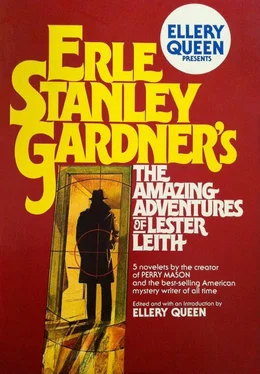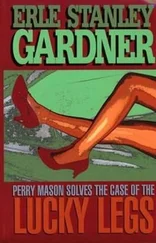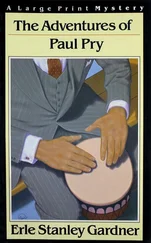The big spy eased the receiver into place. He sat in front of the telephone, his indignant eyes staring at the transmitter. Then, after several seconds of silence, he broke into speech, a low, rumbling monologue in which Sergeant Ackley and his maternal ancestors were described with a wealth of detail.
From time to time during the afternoon, Lester Leith rang the bell which summoned the spy. With each summons, the spy noticed that the relationship between Mrs. Randerman and Lester Leith seemed to become more cordial as the level of the amber liquid in the bottle diminished. With the third drink, they had started calling each other by their first names. With the fourth drink, Mrs. Randerman’s anecdotes of the stage had become more spicy, and by the time Leith escorted Mrs. Randerman to the elevator, they seemed to be friends of long standing.
The spy, shrewdly judging that Leith’s expansive mood and the effect of the Scotch would make it advisable to strike while the iron was hot, busied himself in straightening up the living room, removing glasses and cleaning ashtrays. He hoped that Leith would feel sufficiently talkative to give him an excuse for conversation, and his eyes glistened with satisfaction when he noticed that Leith was quite evidently the victim of what, under other circumstances, would have been described as a “talking jag.”
“A very estimable woman, Scuttle,” Leith said.
“She is indeed, sir.”
“There’s nothing like the stage to give a person an interesting background, Scuttle.”
“Quite right, sir. I believe you said she was to be a business associate.”
Lester Leith shook his head sadly. “It’s all off, Scuttle,” he said, and his face became so lugubrious that the undercover man, watching him sharply, felt that the man upon whom he spied would, on the slightest provocation, transfer his talking jag into a crying jag — which did not suit the spy’s purpose at all.
“I suppose, sir, you’re too young to remember vaudeville in its prime.”
Leith, his last drink seeming to take cumulative effect, said mournfully, “A milestone in our artistic past, Scuttle, a memory... a memory which has become but monument to death of art... Shwept aside by... flickering miles of mass entertainment... movies, Scuttle... radio... blah — losha blah!”
“Yes, sir.”
“Most sad, Scuttle, a sad contemary... a sad con — con — contemporary... a sad... Scuttle, what the devil am I trying to say?”
“A sad commentary, sir?”
“Thash right, Scuttle. Good ole Scuttle, always there in a pinch. Need anything, and you get it. Sad commentary. That’s what I wash trying to say, Scuttle.”
“Yes, sir. And why aren’t you going to use the diamonds and the pearls?” the spy asked, taking advantage of Lester Leith’s condition to press his advantage.
Leith shook his head mournfully. “Can’t do it, Scuttle. Sergeant Ackley’s snooping.”
“But Sergeant Ackley wouldn’t need to know anything about it.”
“Good ole Scuttle! Sentiment reflects upon your intelligence, just as — just as your loyalty reflects upon— No, thash not right. Just as your loyalty— Well, anyhow, Scuttle, just as your concern shows your loyalty.”
“Yes, sir. Perhaps you’ve never taken full advantage of that loyalty, sir.”
“Thash right, Scuttle. Perhaps I haven’t.”
“I notice, sir, that you always play a lone hand. If you’d take me more into your confidence, I could be of even more service to you.”
Leith stared at him owlishly.
“Thash idea, Scuttle,” he said, “but you can’t get ahead of old Ackley. He’s too smart.”
The undercover man said fervently, “I’d like to have your permission, sir, to express my opinion of Sergeant Ackley.”
“Go right ahead, Scuttle. Go right ahead,” Lester Leith said.
The spy went ahead, with a fervor which left no room for doubting his sincerity, and Lester Leith listened with beaming approval.
“Scuttle,” he asked, “did you ever drive mules?”
“No, sir.”
“Never ran a tractor, Scuttle?”
“No, sir.”
Leith shook his head sadly. “Ish a gift, Scuttle. I heard a mule skinner once that was almost as good, and they shay tractor men get a pretty good voca — voca — vocabulary, but they can’t improve on yours, Scuttle.”
“You agree with me, sir?” the spy asked.
Leith said, “I think you’re an excellent judge of character, Scuttle. Know’m lika book, Scuttle.”
The spy made bold to move closer. “If you could tell me just what you had in mind, sir, I think perhaps I could arrange it.”
Lester Leith said owlishly, “Wanted to find out about that man Betcher, Scuttle... purty big private detective, Scuttle, but you can’t tell about ’im. Somethin’ fishy about th’ whole business.”
The spy said eagerly, “Yes sir. I think you’re right, sir.”
Leith nodded. “Thank you, Scuttle. Good ole Scuttle. Always stickin’ up for me.”
“And you intended to use Mrs. Randerman, sir?”
“Thash ri’, Scuttle. Thash the idea. Intended to use Miz Randerman. Going to plant her in the hotel, near Besher. Goin’ to have her flash losh of diamonds and pearls. I was goin’ to put on some false whiskers and be ’er husband, Scuttle. Gonna have a fake burglary and hire Besher to protect the shtuff. Maybe Besher’s a crook, Scuttle. You can’t tell. Nobody c’n tell who’s a crook these days, even the crooks can’t tell. Maybe we’d otta start a census of crooks, Scuttle. Get ’em all tabulated...”
Leith nodded his head drowsily.
The spy, knowing that he had to work fast, said, “You could go right ahead with that plan, sir, and I think we could find some way of outwitting Sergeant Ackley.”
Leith considered the matter with the frowning concentration of one who is having trouble getting his eyes in proper focus. “B’lieve you got somethin’ there, Scuttle. Tell you what y’do, Scuttle. We’ll make a bet. Thash the idea — make a bet. Nobody can critishize a man for makin’ a bet with his valet. Even old sourpuss Ackley couldn’t do that, could he, Scuttle?”
“No, sir.”
“Thash shwell,” Leith said. “We’ll make a bet, Shcuttle. I’ll bet you fifty dollars I can fix up a crime, and Besher would prove he wash a crook. You bet me fifty dollars he wouldn’t. Then you’d go to Sergeant Ackley and ask him if there wash any law against makin’ a bet to try and prove a guy was a crook. He’d say, ‘No,’ and you’d say, Tut it in writing,’ and then we’d have it in writin’, right there in good ole black’n white, Scuttle. Somethin’ he couldn’t wiggle out of... Scuttle, there must’a been a li’l too much in that last drink. Ssh too mush — makesh my head feel big, makesh bandashe hurt. Take th’ bandashe off, Shuttle.”
“Yes, sir,” the spy said, and set about removing the bandage.
A moment later, he said, “I don’t see any bump, sir.”
Lester Leith laughed. “There wasn’t any bump, Shuttle. Jus’ between you and me, I wash gonna use that bandasze to get that twenty-five — get tha’ twenty-five...”
As Leith’s voice trailed away into silence, the spy said, “Just how were you going to use that to get the twenty-five thousand dollars?”
Leith’s eyes suddenly glittered with suspicion. “Did I say anything about twenty-five thousand dollars, Shuttle?”
“No, sir.”
“Then don’t put words in my mouth. Watch that tongue of yours, Shuttle.”
“Yes, sir.”
The fit of suspicion passed as quickly as it had arrived. “Thash all ri’, Shuttle. Good ole Shuttle. Think I’ll lie down for a li’l while, Shuttle.”
“Yes, sir. And you want me to get that letter from Sergeant Ackley?”
Читать дальше












